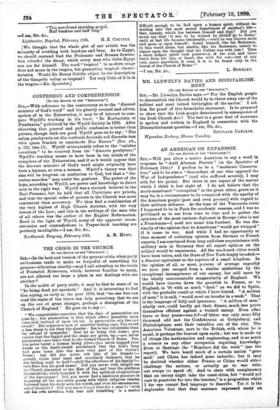CONFESSION AND COMPREHENSION.
[To THE EDITOR, OP TER " SPECTATCHt."]
SIR,—With reference to the controversy as to the "discreet minister of God's word" and his ghostly counsel and advice, spoken of in the Exhortation, it may be of interest to com- pare Wyclif's teaching in his tract, "De Eucharistia et Pcenitentia," published by the Wyclif Society in 1892. After observing that general and public confession is better than private, though both are good, Wyclif goes on to say: " Nec solrtm presbyteris est ilia confessio facienda sed discretis tam viris quam feminis et omnimodo Deo Nostro" (Soc. cit., p. 335, line 15). Wyclif subsequently refers to the " salubre consilium " to be received from the "discrete presbytero." Wyclif's teaching seems to have been in the minds of the compilers of the Exhortation, and if so it would appear that the discreet minister of God's word might originally have been a layman, or even a woman. Wyclif's theory was that sins will be forgiven on confession to God, but that a " dis- cretus sacerdos " may assist the penitent. The power of the keys, according to Wyclif, are power and knowledge to direct men in the right way. Wyclif was a staunch believer in the Real Presence, but he held that all Christians are priests, and that the special order of priests in the Church was more convenient than necessary. We thus find a combination of the very highest of High Church doctrine, with the very lowest of the Low; and this in the writings of the man who of all others was the author of the English Reformation. Read in the light of Wyclif, many of the apparent incon- sistencies and contradictions in Prayer-book teaching are perfectly intelligible.—I am, Sir, &c., Southwood, Torquay, February 13th. A. R. MINT.






































 Previous page
Previous page